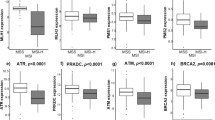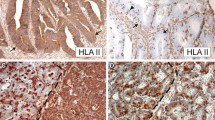Abstract
High level microsatellite instability (MSI-H) is a hallmark of Lynch syndrome-associated colorectal cancer (CRC). MSI-H CRC express immunogenic tumour antigens as a consequence of DNA mismatch repair deficiency-induced frameshift mutations. Consequently, frameshift antigen-specific immune responses are commonly observed in patients with Lynch syndrome-associated MSI-H CRC. Dendritic cells (DC) and macrophages play a crucial role in the induction and modulation of immune responses. We here analysed DC and macrophage infiltration in MSI-H and microsatellite-stable CRC. Sixty-nine CRC (MSI-H, n = 33; microsatellite-stable, n = 36) were examined for the density of tumour-infiltrating DC, Foxp3-positive regulatory T cells, and CD163-positive macrophages. In MSI-H lesions, S100-positive and CD163-positive cell counts were significantly higher compared to microsatellite-stable lesions (S100: epithelium P = 0.018, stroma P = 0.042; CD163: epithelium P < 0.001, stroma P = 0.046). Additionally, numbers of CD208-positive mature DC were significantly elevated in the epithelial compartment of MSI-H CRC (P = 0.027). High numbers of tumour-infiltrating Foxp3-positive T cells were detected in tumours showing a low proportion of CD208-positive, mature DC among the total number of S100-positive cells. Our study demonstrates that infiltration with DC, mature DC, and macrophages is elevated in MSI-H compared to microsatellite-stable CRC. The positive correlation of Foxp3-positive Treg cell density with a low proportion of mature DC suggests that impaired DC maturation may contribute to local immune evasion in CRC. Our results demonstrate that DC and macrophages in the tumour environment likely play an important role in the induction of antigen-specific immune responses in Lynch syndrome. Moreover, impaired DC maturation might contribute to local immune evasion in CRC.


Similar content being viewed by others
Abbreviations
- CRC:
-
Colorectal cancer
- DC:
-
Dendritic cells
- MSI-H:
-
High-level microsatellite instability
- MSS:
-
Microsatellite-stable
- Treg cells:
-
Regulatory T cells
References
Ionov Y, Peinado MA, Malkhosyan S et al (1993) Ubiquitous somatic mutations in simple repeated sequences reveal a new mechanism for colonic carcinogenesis. Nature 363:558–561
Thibodeau SN, Bren G, Schaid D (1993) Microsatellite instability in cancer of the proximal colon. Science 260:816–819
Lynch HT, de la Chapelle A (2003) Hereditary colorectal cancer. N Engl J Med 348:919–932
Linnebacher M, Gebert J, Rudy W et al (2001) Frameshift peptide-derived T-cell epitopes: a source of novel tumour-specific antigens. Int J Cancer 93:6–11
Saeterdal I, Bjorheim J, Lislerud K et al (2001) Frameshift-mutation-derived peptides as tumor-specific antigens in inherited and spontaneous colorectal cancer. Proc Natl Acad Sci USA 98:13255–13260
Schwitalle Y, Kloor M, Eiermann S et al (2008) Immune response against frameshift-induced neopeptides in HNPCC patients and healthy HNPCC mutation carriers. Gastroenterology 134:988–997
Reuschenbach M, Kloor M, Morak M et al (2010) Serum antibodies against frameshift peptides in microsatellite unstable colorectal cancer patients with Lynch syndrome. Fam Cancer 9(2):173–179
Popat S, Hubner R, Houlston RS (2005) Systematic review of microsatellite instability and colorectal cancer prognosis. J Clin Oncol 23:609–618
Buckowitz A, Knaebel HP, Benner A et al (2005) Microsatellite instability in colorectal cancer is associated with local lymphocyte infiltration and low frequency of distant metastases. Br J Cancer 92:1746–1753
Kloor M, Michel S, von Knebel Doeberitz M (2010) Immune evasion of microsatellite unstable colorectal cancers. Int J Cancer 127:1001–1010
Smyrk TC, Watson P, Kaul K et al (2001) Tumour-infiltrating lymphocytes are a marker for microsatellite instability in colorectal carcinoma. Cancer 91:2417–2422
Jenkins MA, Hayashi S, O’Shea AM et al (2007) Pathology features in Bethesda guidelines predict colorectal cancer microsatellite instability: a population-based study. Gastroenterology 133:48–56
Dolcetti R, Viel A, Doglioni C et al (1999) High prevalence of activated intraepithelial cytotoxic T lymphocytes and increased neoplastic cell apoptosis in colorectal carcinomas with microsatellite instability. Am J Pathol 154:1805–1813
Phillips SM, Banerjea A, Feakins R et al (2004) Tumour-infiltrating lymphocytes in colorectal cancer with microsatellite instability are activated and cytotoxic. Br J Surg 91:469–475
Michel S, Benner A, Tariverdian M et al (2008) High density of FOXP3-positive T cells infiltrating colorectal cancers with microsatellite instability. Br J Cancer 99:1867–1873
Banchereau J, Briere F, Caux C et al (2000) Immunobiology of dendritic cells. Annu Rev Immunol 18:767–811
Rutella S, Lemoli RM (2004) Regulatory T cells and tolerogenic dendritic cells: from basic biology to clinical applications. Immunol Lett 94(1–2):11–26
Mantovani A, Sica A, Allavena P et al (2009) Tumor-associated macrophages and the related myeloid-derived suppressor cells as a paradigm of the diversity of macrophage activation. Hum Immunol 70:325–330
Martinez FO, Helming L, Gordon S (2009) Alternative activation of macrophages: an immunologic functional perspective. Annu Rev Immunol 27:451–483
Högger P, Dreier J, Droste A et al (1998) Identification of the integral membrane protein RM3/1 on human monocytes as a glucocorticoid-inducible member of the scavenger receptor cysteine-rich family (CD163). J Immunol 161(4):1883–1890
Boland CR, Thibodeau SN, Hamilton SR et al (1998) A national cancer institute workshop on microsatellite instability for cancer detection and familial predisposition: development of international criteria for the determination of microsatellite instability in colorectal cancer. Cancer Res 58(22):5248–5257
Findeisen P, Kloor M, Merx S et al (2005) T25 repeat in the 3′ untranslated region of the CASP2 gene: a sensitive and specific marker for microsatellite instability in colorectal cancer. Cancer Res 65:8072–8078
Hart DN (1997) Dendritic cells: unique leukocyte populations which control the primary immune response. Blood 90:3245–3287
Nagorsen D, Thiel E (2006) Clinical and immunologic responses to active specific cancer vaccines in human colorectal cancer. Clin Cancer Res 12:3064–3069
Flavell RA, Sanjabi S, Wrzesinski SH et al (2010) The polarization of immune cells in the tumour environment by TGFβ. Nat Rev Immunol 10:554–567
Nagorsen D, Voigt S, Berg E et al (2007) Tumor-infiltrating macrophages and dendritic cells in human colorectal cancer: relation to local regulatory T cells, systemic T-cell response against tumour-associated antigens and survival. J Transl Med 5:62
Vanstapel M-J, Gatter KC, de Wolf-Peeters C et al (1986) New sites of human S-100 immunoreactivity detected with monoclonal antibodies. Am J Clin Pathol 85:160–168
Li ZH, Dulyaninova NG, House RP et al. (2010) S100A4 regulates macrophage chemotaxis. E Mol Biol Cell 21:2598–2610
Dadabayev AR, Sandel MH, Menon AG et al (2004) Dendritic cells in colorectal cancer correlate with other tumour-infiltrating immune cells. Cancer Immunol Immunother 53:978–986
Sandel MH, Dadabayev AR, Menon AG et al (2005) Prognostic value of tumor-infiltrating dendritic cells in colorectal cancer: role of maturation status and intratumoral localization. Clin Cancer Res 11:2576–2582
Saint-Vis B, Vincent J, Vandenabeele S et al (1998) A novel lysosome-associated membrane glycoprotein, DC-LAMP, induced upon DC maturation, is transiently expressed in MHC class II compartment. Immunity 9:325–336
Cui G, Yuan A, Goll R et al (2007) Distinct changes of dendritic cell number and IL-12 mRNA level in adjacent mucosa throughout the colorectal adenoma-carcinoma sequence. Cancer Immunol Immunother 56:1993–2001
Della Porta M, Danova M, Rigolin GM et al (2005) Dendritic cells and vascular endothelial growth factor in colorectal cancer: correlations with clinicobiological findings. Oncology 68:276–284
Liu J, Lu G, Li Z et al (2010) Distinct compartmental distribution of mature and immature dendritic cells in esophageal squamous cell carcinoma. Pathol Res Pract 206(9):602–606
Kushwah R, Wu J, Oliver JR et al (2010) Uptake of apoptotic DC converts immature DC into tolerogenic DC that induce differentiation of Foxp3+ Treg. Eur J Immunol 40:1022–1035
Lutz MB, Schuler G (2002) Immature, semi-mature and fully mature dendritic cells: which signals induce tolerance or immunity? Trends Immunol 23(9):445–449
Groux H, Fournier N, Cottrez F (2004) Role of dendritic cells in the generation of regulatory T cells. Semin Immunol 16:99–106
Smits HH, de Jong EC, Wierenga EA et al (2005) Different faces of regulatory DCs in homeostasis and immunity. Trends Immunol 26:123–129
Yoshimura A, Wakabayashi Y, Mori T (2010) Cellular and molecular basis for the regulation of inflammation by TGF-{beta}. J Biochem 147(6):781–792
Feuerer M, Hill JA, Mathis D, Benoist C (2009) Foxp3+ regulatory T cells: differentiation, specification, subphenotypes. Nat Immunol 10(7):689–695
Loddenkemper C, Schernus M, Noutsias M et al (2006) In situ analysis of FOXP3+ regulatory T cells in human colorectal cancer. J Transl Med 4:52
Suzuki H, Chikazawa N, Tasaka T et al (2010) Intratumoral CD8(+) T/FOXP3(+) cell ratio is a predictive marker for survival in patients with colorectal cancer. Cancer Immunol Immunother 59:653–661
Savage ND, de Boer T, Walburg KV et al (2008) Human anti-inflammatory macrophages induce Foxp3+ GITR+ CD25+ regulatory T cells, which suppress via membrane-bound TGFbeta-1. J Immunol 181:2220–2226
Ambe K, Mori M, Enjoji M (1989) S-100 protein-positive dendritic cells in colorectal adenocarcinomas. Distribution and relation to the clinical prognosis. Cancer 63(3):496–503
Chang KC, Huang GC, Jones D et al (2007) Distribution patterns of dendritic cells and T cells in diffuse large B-cell lymphomas correlate with prognoses. Clin Cancer Res 13:6666–6672
Furihata M, Ohtsuki Y, Ido E et al (1992) HLA-DR antigen- and S-100 protein-positive dendritic cells in esophageal squamous cell carcinoma–their distribution in relation to prognosis. Virchows Arch B Cell Pathol Incl Mol Pathol 61:409–414
Acknowledgments
The excellent technical assistance of Beate Kuchenbuch and Carina Konrad is gratefully acknowledged. The study was funded in part by the Deutsche Krebshilfe (German Cancer Aid).
Conflict of interest statement
The authors declare that they have no conflict of interests.
Author information
Authors and Affiliations
Corresponding author
Rights and permissions
About this article
Cite this article
Bauer, K., Michel, S., Reuschenbach, M. et al. Dendritic cell and macrophage infiltration in microsatellite-unstable and microsatellite-stable colorectal cancer. Familial Cancer 10, 557–565 (2011). https://doi.org/10.1007/s10689-011-9449-7
Published:
Issue Date:
DOI: https://doi.org/10.1007/s10689-011-9449-7




